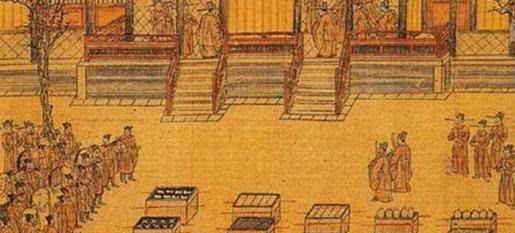One day in 513 BC, in the square of the capital of the Jin Dynasty, a group of soldiers brought a 480-kilogram large iron ding full of words. Ding was officially cast, with the hosts Zhao Martin and Xun Yin both being the backbone figures in the six secretaries of the Jin dynasty; the content of Ding was also an official document, a penal book formulated by Fan Xuanzi, the former zhengqing of the Jin dynasty, in 550 BC. Unexpectedly, this incident caused an uproar in the "international", and Confucius beat his chest and shouted: "Jin Qi is dead!" Lose it! ”
Why was Confucius so surprised? To take his words: "Noble and lowly, the so-called degree is also ... Now that it is a degree of abandonment, but for the punishment of Ding, the people are in Ding, how can it be honored? What is your business? Noble and disorderly, why is it a country? "Why do the common people no longer respect the nobles when they see the provisions of the law?"

Uncle Xiang, the minister of the Jin Dynasty, had already explained this. At that time, Zheng Guo's ruling son also cast a big ding, cast the provisions of the national laws on it, and put the ding in the prosperous place of the city to announce to the world. Shu Xiang was surprised to see this, and wrote a letter to zi chan, which said: "If the first king deliberates on the rules, he will not be punished, and he will be afraid of the people's contention... If the people know that there is insight, they are not afraid of the superior, and they have a contentious heart, so as to recruit in the book, and to be fortunate to succeed in it. "When the common people pass the law, they will use the law to fight against the nobles and lords!"
During the Spring and Autumn Period, slave owners and nobles could use torture on civilians at will, and their power could be said to be extremely large. Even if someone made some laws, they would be hidden in the secret house, monopolized by the nobility, and not let the people know. Only by maintaining this mysteriousness and terror can it be convenient for the nobles to dispose of the people at will. However, as soon as the punishment was cast, this monopoly was broken, the common people could invoke the law to protect their rights and interests, and the power of the aristocratic class was naturally weakened.
In fact, as Confucius and Shu Xiang suspected, the advent of the punishment was not an inadvertent whim of a certain qing doctor, but an inevitable product of the decline of slave society and the continuous seizure of power by the new feudal landlord class. In the case of the Jin Dynasty, the emergence of the Punishment Ding has several major political backgrounds.
The first is the decline of the Jin monarch, who represents the old forces. From the beginning of the Jin Pinggong, the power of the Jin monarchy began to gradually decline, and the power gradually shifted to the hands of various secretaries representing the emerging landlord class, the most powerful of which were han, Zhao, Wei, Fan, the Bank of China and the Zhi clan. Fan Xuanzi was the patriarch of the Fan clan, Zhao Martin was the patriarch of the Zhao clan, and Xun Yin was the patriarch of the Zhonghang clan, all of whom were representative figures in the Liuqing. Fan Xuanzi formulated the book of punishment, and Zhao Martin and Xun Yin cast it on the top, first targeting Jin Jun. With the written law, the Qing masters could compete with the Jin Jun.
The second is the competition and balance between the six secretaries of the Jin Dynasty. The relationship between the six secretaries is intricate, with both a cooperative side and a competitive side, taking turns in the Jin dynasty's political arena and checking and balancing each other. In the absence of anyone with an overwhelming advantage that can break the balance and eliminate other opponents in one fell swoop, in order to maintain a relatively stable situation and gain space for peaceful development, the six secretaries need to establish a set of commonly recognized rules of the game that can be used to mediate contradictions through consultation, and this is the role that the criminals can play.
Finally, with the development of social economy, the political status and role of the scholars, the people under the Six Secretaries, the People of the Nation and other groups are also constantly improving, and the six Secretaries' move to cast the punishment is also to give up some of the power to these groups in order to achieve the purpose of winning the hearts and minds of the people.
As Confucius predicted, as the power of the Jin Emperor continued to transfer to Qing Dafu, 79 years after the formation of the Punishment, that is, in 434 BC, the remaining Three Families of Han, Zhao, and Wei in the Six Qings divided almost all the land of the Jin State, and the Jin Jun began to exist in name only, and completely disappeared from history after 58 years. Not only was this the case in the Jin Dynasty, but marked by the division of the three families into the Jin Dynasty, China also moved from the Spring and Autumn Period to the Warring States, from a slave society to a feudal society.